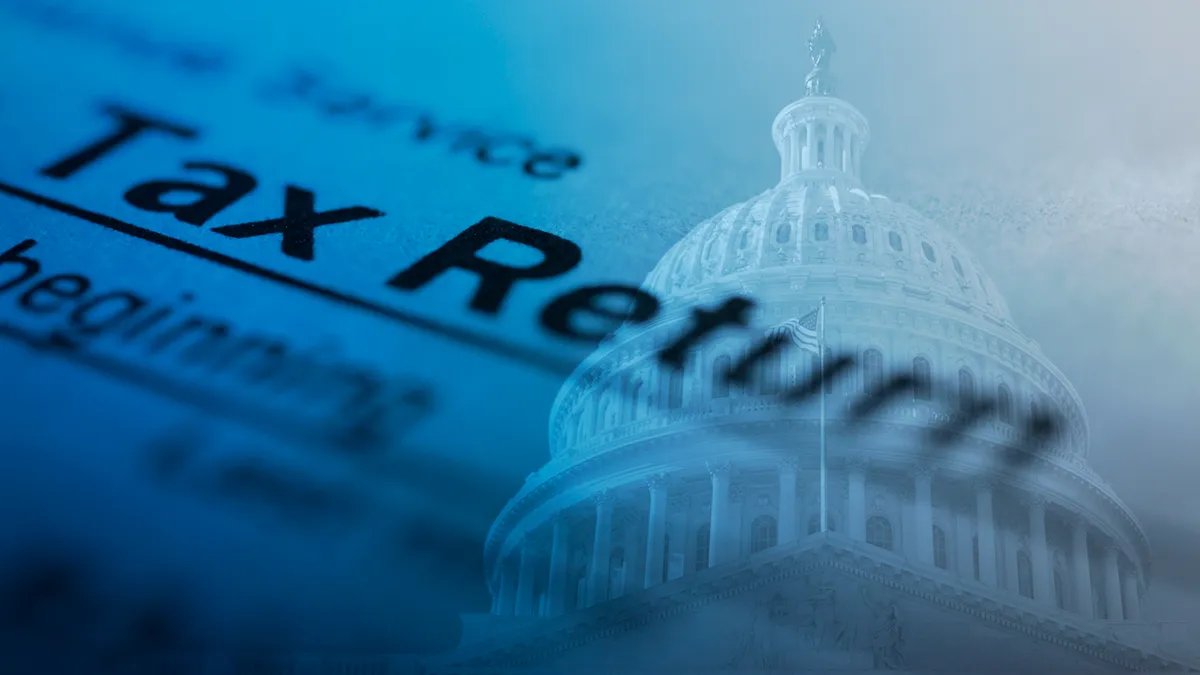The K-12 sector should brace for change.
The 30-plus-year drought since the last tax code overhaul is over now that President Donald Trump has signed Congress' Tax Cuts and Jobs Act into law.
The bill slashes the corporate tax rate from 35% to 21%, and also includes massive changes to how income earned or kept offshore is treated.
In other words, the move is monumental for business accounts nationwide. Every industry could see effects — including education. Here's a 60-second overview of what the bill could change, and where industry associations stand on it:
EDUCATION: K-12
IMPACT: Tax rewrite could impact school funding, 529 plans, teacher deductions.
POSITION: For public schools, the proposal presents yet another threat to already-stretched funding, though teachers will retain an annual deduction for supplies.
ANALYSIS: Under current laws, taxpayers can deduct what they pay in state and local taxes, a provision that naturally benefits wealthier Americans who pay more. The updated tax bill would allow single and married taxpayers to deduct up to $10,000 in state and local taxes—property, sales or income. The earlier proposal would have allowed filers to deduct all state and local taxes.
An earlier proposal would have eliminated that deduction, which education analysts suggested could lead to increases in other taxes and likely impact state and local funding for education. The National Education Association had predict a cost to public schools of $370 million over 10 years, leading to job cuts for teachers. The latest proposal would cause less of a hit, but could still impact state spending.
The final bill also doubles the Child Tax Credit from $1,000 to $2,000, and extends the deduction for families earning up to $400,000 per year. Up to $1,400 of the credit is also refundable, which puts money into the hands of low-income families who would not otherwise earn enough to actually owe federal taxes.
Additionally, families putting money away in 529 plans for their children’s college education could withdraw up to $10,000 without a penalty in order to pay for private school or even home-schooling expenses. Opponents say the provision doesn’t help most families and can hurt savings for college in long run.
Finally, the bill will leave in place a teacher deduction of $250 annually for money spent on school supplies out of their own pockets. Earlier proposals had suggested cutting the deduction altogether or doubling it to $500. Educators reportedly spend $1.6 billion of their own money on school supplies each year — an amount that comes down to an average of about $485 per individual teacher.
Roger Riddell, Linda Jacobson / Education Dive
EDUCATION: HIGHER ED
IMPACT: Higher ed leaders are watching closely to see how impacts to itemized deductions will impact charitable giving, and many are concerned a number of changes would decrease state appropriations while increasing the tax burden for the industry’s largest institutions.
POSITION: Because of the broad differences in the sizes, budgets and missions of higher education, there are differing positions on the legislation. However, many of the largest and wealthiest institutions may see a greater impact to their bottom lines via endowment taxes and new taxes on the top-paid officials, and smaller institutions are keeping a close eye on how charitable giving changes will impact day-to-day operations.
ANALYSIS: Some of the biggest concerns in the tax bill for higher education leaders are the proposed endowment tax for private institutions; the changes to individual deductions, including changes to the way charitable giving can be itemized and the ability to deduct state and local income taxes; and the elimination of private activity bonds that can impact college and university foundations that are involved in real estate. The bill also proposes a 21% tax on the top-five paid individuals with salaries over $1 million at nonprofit organizations, which puts institutions on the hook for paying a tax on the salaries of the president and men’s basketball and football coaches.
The inability to deduct state and local income taxes still worries many higher ed administrators that there will be pressure on states and localities not to raise taxes, which means that though some individuals may see an increase in net earnings, there will be increasingly tough decisions about discretionary funding in state houses — and further cuts to higher ed at the state level. And though individuals will still be able to deduct charitable gifts, the required threshold for itemization would mean an estimated loss of $12 billion to $20 billion per year for the industry starting in 2018. And the elimination of the 80% deduction for seat licenses at college sporting events may mean athletics departments lose a major incentive for potential program donors, as well, which could shift some of the athletics budget burden back to the institution. While tuition waivers are saved from taxable income and the committee agreed to preserve the ability to deduct student loan interest, there are still a number of provisions that will impact institutions if this bill is passed.
Autumn Arnett / Education Dive
HUMAN RESOURCES
IMPACT: Tax reform is expected to impact several areas of interest to HR: paid leave, fringe benefits, automation and offshoring.
POSITION: The tax proposal could, on balance, be good for companies and in turn good for HR professionals. The industry has not taken a specific stance on the issue to date.
ANALYSIS: Tax reform is expected to impact several areas of interest to HR including some core issues such as paid leave, fringe benefits, automation and offshoring.
One proposal would give employers a tax credit equal to 25% of an employee's salary if it paid them during FMLA leave. There are several proposals to scrap deductions for benefits employers often are involved in, like transportation and relocation expenses.
Some thought the bill might create new tax incentives to encourage employers to create jobs. (That's what the Trump administration promised, after all.) Instead, it proposes to allow employers to write off the full value of machines right away, perhaps encouraging automation without an accompanying incentive for hiring humans.
The bill proposes to exempt some income from U.S. companies with operations outside the country. This encourages business to send work overseas, some experts have said.
HR will probably like the paid leave proposal, as it gets at an existing problem without a mandate. Instead, it's an incentive to do something many are already doing anyway. On the flip side, the fringe benefit exclusions do the opposite, creating a disincentive for employers to offer those benefits.
The automation and offshoring items are, on their face, good news for companies. Some, however, say they're not as useful without an incentive to hire people, too. After all, machines can't be upskilled when needs shift.
Kate Tornone / HR Dive
TECHNOLOGY
IMPACT: Tech companies with large overseas cash holdings will benefit from cuts to corporate tax rates, but SMBs and companies with larger domestic holdings may not be as lucky.
POSITION: Big tech lobbied hard for a cut to the corporate tax rate, but the loss of R&D tax breaks and new income tax applications on grad students may undercut the win.
ANALYSIS: The corporate tax rate currently sits at 35%, but the tech sector on average pays much lower than that. For example, the average tax rate is about 16% for computer services companies and about 25% for internet software companies, according to Aswath Damodaran, professor at the Stern School of Business professor. Moving the overall rate down to 21% may not benefit tech as much as other sectors since the industry already has lower rates.
The lowered, one-time repatriation tax, however, will have a greater effect. Tech tops the list of U.S. companies with the largest overseas cash holdings. More than $564 billion is held abroad between Apple, Microsoft, Cisco, Alphabet and Oracle — $246 billion of which belongs to Apple alone.
The tax levied on overseas cash will drop from the current 35% corporate rate to 15.5% under tax reform. Less liquid assets will be taxed at 8%. For companies without large overseas cash holdings, the benefits are less substantial.
Alex Hickey / CIO Dive






















